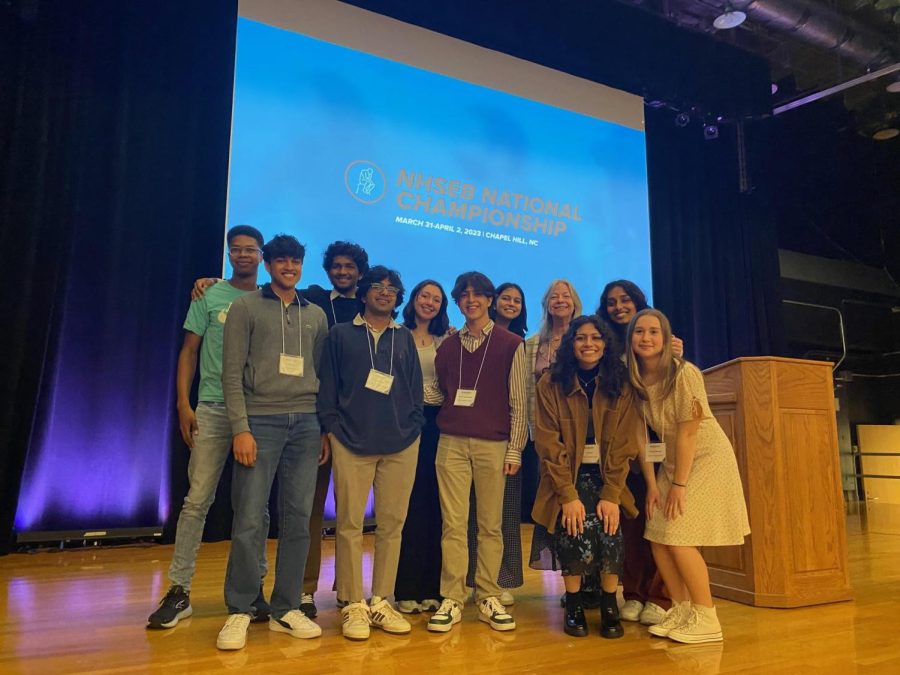Morally permissible or morally impermissible?
The National High School Ethics Bowl is a competitive and collaborative event in which students from across the nation discuss real-life ethical issues in teams. Despite what its name may suggest about the nature of the competition, the occurrences at this year’s as well as past competitions expose the bias and inconsistencies involved in determining the winners of the Ethics Bowl.
Pleasant Valley’s Ethics Bowl team was founded in 2021 and led by English teacher Lynne Lundberg, who believed the analytical nature of the competition would be a beneficial practice for her students.
“I read about Ethics Bowl in a newspaper article about six years ago and, after some research and careful planning, decided it would fit well into the AP English Language and Composition curriculum. I had assigned the research and discussion in class for a few years before anyone expressed interest in competition,” Lundberg stated.
When students became interested in participating in Ethics Bowl last year, Lundberg got administrative approval to start competing.
The National High School Ethics Bowl organization releases 15 discussion topics for state and regional competition each year. At team meetings, members discuss those topics, report the research done on the cases and establish clear arguments to support the team’s position. It’s only then that they can begin practicing.
“Sometimes practice looks like a round of competition, while sometimes we play with the format to give more people a chance to present a case,” Lundberg continued. “My goal as coach is that every case has a few experts, but that everyone on the team is ready to argue every case.”
This year, PV had two teams with a total of 13 students competing at the state tournament. Those two teams were both undefeated in the four preliminary rounds, so they joined forces in the national round to close out the tournament at the University of North Carolina.
While PV saw a successful year by placing 10th overall at the national level, certain factors of the event aroused dissatisfaction among the Ethics Bowl members.
The judging system at the championships was not standardized, as some judges were philosophy professors and some were simply volunteers from the school. While certain judges gave detailed comments and constructive feedback, others were not able to provide helpful feedback.
Margil Sanchez Carmona, the only junior on the PV Ethics Bowl team, believed the commentary given from judges at regional level were more valuable than from nationals. “I really liked the state competition, as the judges were all experienced, unlike a few national judges, and had questions that seemed to be more based on applying and expanding our stance rather than defending it, which I personally believe is more to the spirit of ethics bowl,” Carmona stated.
Rankings were another point of contention; PV was given a finishing place of 10th based on the votes that judges awarded to them. However, by the standards of the rubric used to award those votes, they would’ve finished fifth.
Given how heavily weighted the judges’ votes are and the inconsistent skillsets of the judges, bias is more likely to impact the outcome of the competition.
Senior Gretchen Highberger has participated in Ethics Bowl for two years and was bittered by opposing teams’ arguments because of their constant use of personal anecdotes to prove their points and to sway the judges.
“It’s a useful technique in judged rounds to watch for an emotional reaction from a judge and then extrapolate on that, and this occurred multiple times during our round. It’s extremely hard for competitors to advance conversation when they are presented with arguments based on personal connections and emotion, as making an opposing argument could be misconstrued as a failure to recognize the validity of someone’s experiences and beliefs,” Highberger stated.
Ethics Bowl is an opportunity for students to engage in meaningful discourse through critical thinking and collaboration with the opposing team’s views. However, when discussions are situated solely within the realm of ethos, it’s hard for the other team to create nuance.
The PV members were also shocked by one of the presentations, as there was a prominent performance-like quality to it. The speaker would try to impress the judges not through their words, but by using exaggerated facial expressions and movements like they were in theater. In other presentations, it appeared that people who spoke elegantly rather than having a sophisticated, sound argument were consistently winning.
“I also noticed that a lot of the times some pretty surface-level arguments were strongly favored, which is just perplexing,” Carmona continued. “In some rounds, it was definitely the team with the more flowery language and the ‘buzzwords’ that was also favored.”
PV students were also suspicious that the brackets facilitated the winning teams’ success, as each team that PV matched against ended up placing in the top half of the leaderboard, whereas the highest ranked teams were matched with teams placed in the lower half.
Highberger was frustrated with how the current structure of NHSEB gives certain teams an unfair advantage. “Some teams, like ourselves, face competitive, high-level teams all day, and while our judges’ points rank high, this does not help us advance, as advancement to the second day is based on the number of rounds won,” Highberger shared.
Although the PV Ethics Bowl team faced a disadvantageous year for competition, their persistence in overcoming these challenges and earning 10th place in the country underscores their tenacity and ability to flourish in challenging situations.










